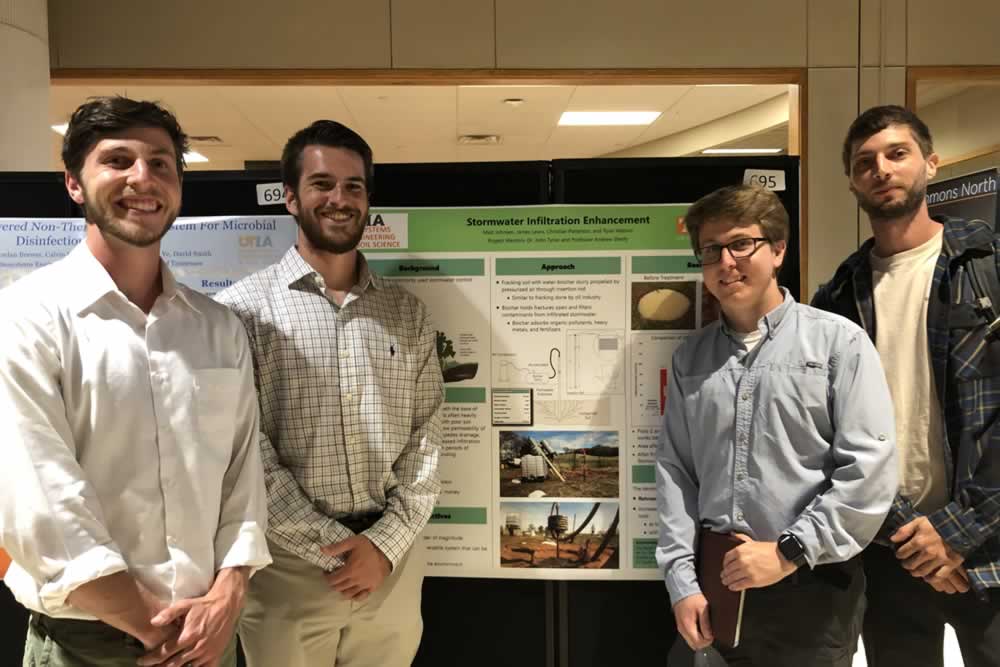
KNOXVILLE, Tenn. — Four University of Tennessee Institute of Agriculture students are celebrating after earning high honors in their field. The Biosystems Engineering Senior Design Team won first place in the G.B. Gunlogson Student Environmental Design Open Competition at the American Society of Agricultural and Biological Engineers (ASABE) international meeting in Boston in July.
The student project, titled “Soil Fracking for Stormwater Infiltration Enhancement,” represents an entire academic year of work and collaboration. Overall, nine collegiate teams submitted designs and three were invited to participate in the oral competition held at ASABE’s international meeting. Once the projects and oral presentations were scored, winners were announced with the UT biosystems engineering design team taking first place.
The team’s project is a pilot technology that could unclog rain gardens by emulating hydraulic fracking used by the oil and gas industry. Rain gardens are common stormwater control measures, but when they are installed above heavily compacted soil, they can become inundated with ponded stormwater that will not infiltrate the surrounding soil due to low permeability. The team’s hydraulic technique induces fractures in deep, compacted soil layers, mitigating rain garden failure by offering connected pathways or fractures for stormwater to enter the subsoil. Utilizing this technique, rather than demolishing and re-installing the rain garden infrastructure, would result in immense cost and time savings for homeowners and others with rain gardens on their property.
“This project translates into the real-world space,” says Julie Carrier, department head for Biosystems Engineering and Soil Science at UTIA. “And this summer a UT Extension intern is completing further testing of the design, with hopes that others in Tennessee can be trained in the technique and use it in their own areas of the state.”
“The fact that the team’s project was able to progress through these next steps of testing is evidence of the effort and ability of the design team,” comments Andrea Ludwig, associate professor and UT Extension specialist. “A real world application certainly sets it apart from other design projects in the competition.”
This is the sixth win for UT students in the past ten years. The design was originally presented in April at UT’s Exhibition of Undergraduate Research and Creative Achievement (EUReCA), winning second place.
Members of the Senior Design Team are Matthew Johnsen (Oak Ridge, Tennessee), James Lewis (Knoxville, Tennessee), Christian Patterson (Chattanooga, Tennessee), and Ryan Watson (Brownsville, Tennessee). All four students graduated in 2019. The team is advised by associate professor John Tyner and senior lecturer Andrew Sherfy, both from the Department of Biosystems Engineering and Soil Science.
“I am immensely proud of what our design team accomplished,” says Patterson. “The capstone experience was rigorous and rewarding, with both professional and personal growth. None of it would be possible without the support of the Biosystems Engineering and Soil Science faculty and staff.”
Through its mission of research, teaching and extension, the University of Tennessee Institute of Agriculture touches lives and provides Real. Life. Solutions. ag.tennessee.edu.
###
Demonstration video of the device available on Facebook.